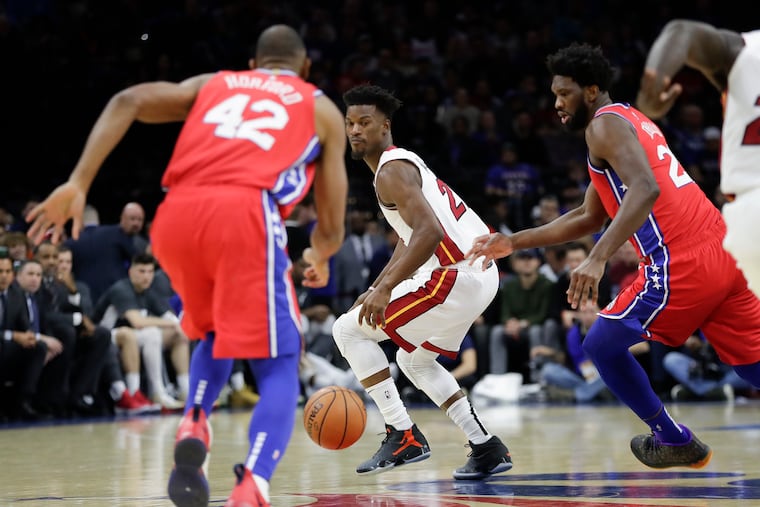In Jimmy Butler’s return to Philadelphia, the Sixers made an emphatic case that they are better off without him | David Murphy
Former 76er Jimmy Butler did not have a very pleasant return to Philadelphia as the Sixers routed the Miami Heat.

There was an hour before game time, and Jimmy Butler looked as locked in as a man lounging on his sofa.
Dressed in an all-black sweatsuit, the bottom of each pant leg tucked into a white athletic sock, the veteran guard leaned back in a court-side seat as a procession of well-wishers trickled past. On his face was a familiar smile: wry and detached, brow arching, his mischievous eyes matching the sparkle of his diamond-crusted earrings in the warm arena light. It was the look of a man who senses he is one step ahead of his surroundings.
Three hours later, after the Sixers welcomed him back to the Wells Fargo Center with a 113-86 shellacking, Butler tried his best to maintain his lead position. Sitting at a wooden stall inside the visitors’ locker room, the player who seven months earlier led the Sixers to within a last-second shot of the Eastern Conference finals declared them just another opponent.
“Just another NBA game, man,” he said.
The boos that thundered down from the stands every time he touched the ball?
“Tell you the truth, I legit didn’t even pay attention, didn’t too much hear it," Butler said. “I heard people talking to me after the game was almost over, but I really don’t pay attention to it.”
This is how it has gone ever since July, when the Sixers facilitated Butler’s signing with the Heat by trading him for Josh Richardson. In the handful of interviews he has given since those early July days that reshaped the Eastern Conference, Butler has consistently declined to discuss specifics of the contract talks that took place with his former employer.
Likewise, the Sixers have never provided anything approaching a hint about the foundations of the decision-making process that led them to turn the page from Butler to Richardson and Al Horford.
“I mean, he had some great games for us," Sixers coach Brett Brown said. "We came close at the end. And sometimes things just don’t work out. He’s in a good place. He’s in a really good place. And we wish him well.”
Whatever the reality of the situation, the reactions from player and team suggest that this might have been one of those rare times where both parties understood and accepted that each would be better off without the other.
On Saturday night, the Sixers made as strong a case as anybody could have expected, swarming the Heat with their length and speed and battering them with their size. In the opening period, they raced out to a 20-point lead, scoring 11 of their first 26 points in transition.
Whether it was Joel Embiid against Bam Adebayo or Tobias Harris against Tyler Herro, the Sixers exploited their obvious physical advantage to a degree that we had yet to see this season. Embiid finished with 23 points, and Harris with 19. Richardson, meanwhile, led all scorers with 32 against his former team.
As for Butler, well, he looked like a player in need of a lot more talent around him. The Heat may have entered the evening with the second-best record in the conference, but they spent four quarters looking like a team without a legitimate claim to title-contender status. They shot just 41% from the field, including 6 of 24 from three, with their frequent misses routinely enabling the Sixers to push the pace in transition.
To a certain extent, this was not all that surprising. Both teams were playing the second half of a back-to-back. But while the Sixers spent Friday night at home, the Heat were playing in Chicago. Combined with the absence of starting three-man Justise Winslow, the situation did not do the Heat or their new centerpiece any favors.
While this may not have been a definitive referendum on Elton Brand’s offseason decision-making, it was certainly an example of the sort of upside that he envisions for his team. That their most complete offensive performance came in Butler’s return was, at the very least, a fortunate coincidence. Last season, the Sixers won 35 of the 55 regular season games in which he played, a 52-win pace that is four victories short of the one that they currently carry.
On Saturday, there were handful of moments were classic Butler, plays where he impacted the game the way he did for the Sixers last spring. Late in the first quarter with the Heat trailing 28-8, he got into the lane off the dribble and then kicked out to the corner for an open three-point look, then rebounded Goran Dragic’s miss and kicked out to the top of the arc, where Herro finally drained a bucket. Midway through the second quarter, he picked Horford’s pocket and coasted down the court for an uncontested dunk.
Mostly, though, he was a nonfactor, finishing the night with 11 points on 4-for-13 shooting and a minus-31.
Butler has spent much of the season as the Heat’s primary ballhandler. He entered the night averaging seven assists per game, more than double his career average. It’s a role he played for the Sixers down the stretch last season, but one that would be difficult sustain while playing next to Ben Simmons.
“That’s something in the past,” Butler said. “I’ll leave it there.”
For the Sixers, at least, Saturday night will go down as an emphatic statement about the present.